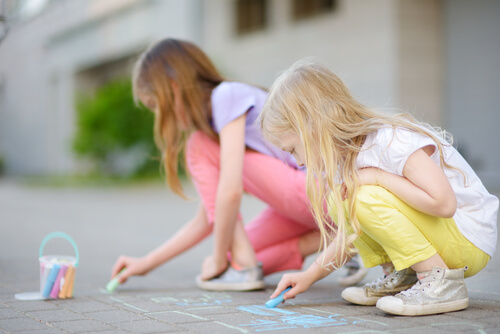How to Encourage Creativity in Children

It’s important to encourage creativity in children from an early age. But what is the best way to do this? And what are the benefits?
What is creativity? How does it influence children?
The concept of creativity can be described as a person’s ability to create new concepts or ideas, resulting in original solutions. In other words, we’re talking about creative thinking or original thinking. Hence, this quote comes to mind:
“Don’t think. Thinking is the enemy of creativity. It’s self-conscious and anything self-conscious is lousy. You can’t try to do things. You simply must do things.”
–Ray Bradbury (1920-2012)–
Creative people can come up with innovative ideas to overcome obstacles. Thanks to this, they solve everyday problems without anxiety or stress. This explains why we should encourage creativity in children: constructive imagination leads to original solutions.
The importance of encouraging creativity in children
Though creativity is essential at any age, it’s best to stimulate it from a young age. All abilities develop and grow during infancy.
In addition, creativity helps children solve problems, often without their parents’ help, thus improving self-sufficiency. Independent children can interact with others in a more productive way and without problems.
We must encourage creativity at the right time
Seeing as encouraging creativity in children is basic for overall learning, we should take timing into account. Each child has a unique learning curve, which we must respect so that he or she can fully develop a healthy imagination.

Ways to improve creativity in children
Now we know why creativity is important, so let’s talk about how to encourage it. Here are some suggestions:
- Allow children to choose their own colors. In other words, give them freedom to color in a drawing in different ways. After that, they can choose whichever way they prefer. This encourages diversity, as opposed to monotony.
- Set a writing challenge. For example, ask them to write as many words as they can come up with following a certain rule, such as words beginning with a specific letter: E for elephant, M for mouse…
- Sentence building. We can ask them to come up with a sentence containing two or three given words.
Questions and costumes
Another idea is to use questions to prompt children to think of imaginative answers. If we want this to work, the questions need to be well thought out.
Also, using costumes in a specific activity helps them develop their imagination. However, it’s best to try and create homemade costumes from the things we have at hand instead of store-bought packs.
Giving them some space
If we want children to be creative, they need to have a chance for it. We must give them time and space to play and be themselves, without any limits, particularly while they play. But, they must follow the behavior rules set at home.
Parents must set activities in a balanced manner if they want their children to develop creativity. To achieve this, we must set a weekly time for free play-time.
Congratulating them for ideas and innovations
It accomplishes nothing to laugh at children’s ideas. To the contrary, we must pay attention to their stories, songs and drawings, and reward them if possible.
Similarly, we must teach them not to laugh at others’ ideas as well. Other children should also be complimented for their new ideas. This way we’ll encourage creativity in other children.
Benefits of encouraging creativity in children
When we encourage creativity in children, we can expect some of the following benefits:
- Self-esteem improves, because creativity provides resourcefulness.
- Children have a better understanding of their abilities.
- Communication with others improves, because children learn to express their feelings and to be accepting of others.

Children learn creative problem solving
Developing creativity improves the ability to overcome obstacles. Additionally, it develops sensitivity, improving well-being in children as well as in adults.
Creativity fosters integrity in children
Thanks to creativity, we develop qualities such as integrity in life and work. This trait manifests in creative people, even if they’re children.
Creativity allows the development of natural gifts. If a child feels free to express him- or herself in a creative way, he or she will explore innate inclinations regarding work or activities. Those who foster creativity are more likely to stand out in their careers, precisely because of their original ideas.
Creativity provides self-sufficiency
If we understand creativity as the ability to come up with new ideas and concepts, we can see how this is an important tool to solve everyday problems. Consequently, having an open mind is a great resource when it comes to finding new and original solutions.
It’s important to encourage creativity in children from an early age. But what is the best way to do this? And what are the benefits?
What is creativity? How does it influence children?
The concept of creativity can be described as a person’s ability to create new concepts or ideas, resulting in original solutions. In other words, we’re talking about creative thinking or original thinking. Hence, this quote comes to mind:
“Don’t think. Thinking is the enemy of creativity. It’s self-conscious and anything self-conscious is lousy. You can’t try to do things. You simply must do things.”
–Ray Bradbury (1920-2012)–
Creative people can come up with innovative ideas to overcome obstacles. Thanks to this, they solve everyday problems without anxiety or stress. This explains why we should encourage creativity in children: constructive imagination leads to original solutions.
The importance of encouraging creativity in children
Though creativity is essential at any age, it’s best to stimulate it from a young age. All abilities develop and grow during infancy.
In addition, creativity helps children solve problems, often without their parents’ help, thus improving self-sufficiency. Independent children can interact with others in a more productive way and without problems.
We must encourage creativity at the right time
Seeing as encouraging creativity in children is basic for overall learning, we should take timing into account. Each child has a unique learning curve, which we must respect so that he or she can fully develop a healthy imagination.

Ways to improve creativity in children
Now we know why creativity is important, so let’s talk about how to encourage it. Here are some suggestions:
- Allow children to choose their own colors. In other words, give them freedom to color in a drawing in different ways. After that, they can choose whichever way they prefer. This encourages diversity, as opposed to monotony.
- Set a writing challenge. For example, ask them to write as many words as they can come up with following a certain rule, such as words beginning with a specific letter: E for elephant, M for mouse…
- Sentence building. We can ask them to come up with a sentence containing two or three given words.
Questions and costumes
Another idea is to use questions to prompt children to think of imaginative answers. If we want this to work, the questions need to be well thought out.
Also, using costumes in a specific activity helps them develop their imagination. However, it’s best to try and create homemade costumes from the things we have at hand instead of store-bought packs.
Giving them some space
If we want children to be creative, they need to have a chance for it. We must give them time and space to play and be themselves, without any limits, particularly while they play. But, they must follow the behavior rules set at home.
Parents must set activities in a balanced manner if they want their children to develop creativity. To achieve this, we must set a weekly time for free play-time.
Congratulating them for ideas and innovations
It accomplishes nothing to laugh at children’s ideas. To the contrary, we must pay attention to their stories, songs and drawings, and reward them if possible.
Similarly, we must teach them not to laugh at others’ ideas as well. Other children should also be complimented for their new ideas. This way we’ll encourage creativity in other children.
Benefits of encouraging creativity in children
When we encourage creativity in children, we can expect some of the following benefits:
- Self-esteem improves, because creativity provides resourcefulness.
- Children have a better understanding of their abilities.
- Communication with others improves, because children learn to express their feelings and to be accepting of others.

Children learn creative problem solving
Developing creativity improves the ability to overcome obstacles. Additionally, it develops sensitivity, improving well-being in children as well as in adults.
Creativity fosters integrity in children
Thanks to creativity, we develop qualities such as integrity in life and work. This trait manifests in creative people, even if they’re children.
Creativity allows the development of natural gifts. If a child feels free to express him- or herself in a creative way, he or she will explore innate inclinations regarding work or activities. Those who foster creativity are more likely to stand out in their careers, precisely because of their original ideas.
Creativity provides self-sufficiency
If we understand creativity as the ability to come up with new ideas and concepts, we can see how this is an important tool to solve everyday problems. Consequently, having an open mind is a great resource when it comes to finding new and original solutions.
All cited sources were thoroughly reviewed by our team to ensure their quality, reliability, currency, and validity. The bibliography of this article was considered reliable and of academic or scientific accuracy.
- Lowenfeld, V. (1987). Desarrollo de la capacidad creadora. Ed. Kapelusz. Argentina: Buenos aires.
- Madi, I. (2012). La creatividad y el Niño. Palibrio. Estados Unidos.
- López Lagos, M. S., & Venegas Bernal, M. P. (2012). Generando grandes pensadores pequeños: la sinéctica como estrategia de enseñanza que estimula el desarrollo del pensamiento creativo. https://ciencia.lasalle.edu.co/cgi/viewcontent.cgi?article=1071&context=maest_docencia
- Romo Santos, M. (1998). Algunas claves para fomentar la creatividad en el aula. https://repositorio.uam.es/bitstream/handle/10486/5220/33094_25.pdf?sequence=1
- Vargas, R. R. (2001). Niños creativos.
- Wallon, P., Cambier, A. y Engelhart, D. (1992). El dibujo del niño. Siglo XXI editores. España: Madrid.
This text is provided for informational purposes only and does not replace consultation with a professional. If in doubt, consult your specialist.








